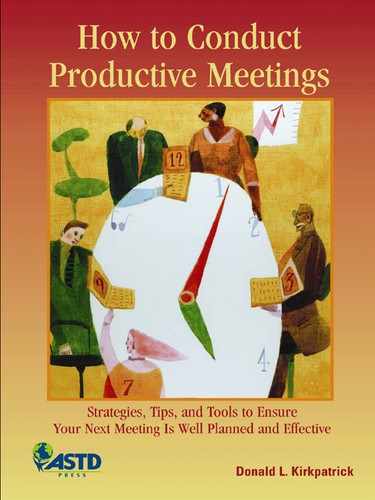Preface
![]()
I conducted conferences and workshops for the University of Wisconsin's Management Institute for over 25 years, and one of my favorite topics was time management. One of my regular questions to the participants was “What are your time robbers?” The three most frequently mentioned time robbers were waiting, unclear communication that resulted in rework, and time wasted in meetings. Participants responded with time wasted in meetings about 50 percent of the time!
The participants at these conferences and workshops were supervisors, foremen, and department heads who were referring primarily to staff meetings conducted by their bosses. From this, I regularly began conducting a workshop on how to conduct productive meetings.
It is interesting to note that I have seldom heard of training departments or corporate universities conducting workshops on this topic. They seem to be busy with programs on diversity, leadership, empowerment, teamwork, change management, and other popular topics. I have no quarrel with these topics, but I wonder what ever happened to meeting the need for productive meetings.
When Mark Morrow of ASTD asked me to write a book on the subject, I immediately agreed. My other new editions of Evaluating Training Programs: The Four Levels and Improving Employee Performance Through Appraisal and Coaching were finished, so I told Mark I was ready and eager to go.
This book is written for two audiences. First of all, it will be of practical help to those line managers who conduct departmental, project, and other types of meetings with subordinates. Next, it will be of practical help to training professionals who conduct workshops on the subject for line managers. (I also hope it will motivate them to do it!) It will also be a challenge to training professionals, regarding all of the training meetings they conduct. They know that participants expect the best from training professionals and don't want to waste any time in their meetings. Trainers may want to give each participant a copy of the book for further study and reference.
So, I urge you to accept the challenge of answering the pretest before you read the book. And be sure to do the posttest after reading the book to see what you learned or what concepts, principles, and techniques were confirmed.
I would personally like to thank April Michelle Davis for the excellent job of editing.
I wish to dedicate this book to my wife, Fern, for her patience and understanding of the time it takes to write a book.
